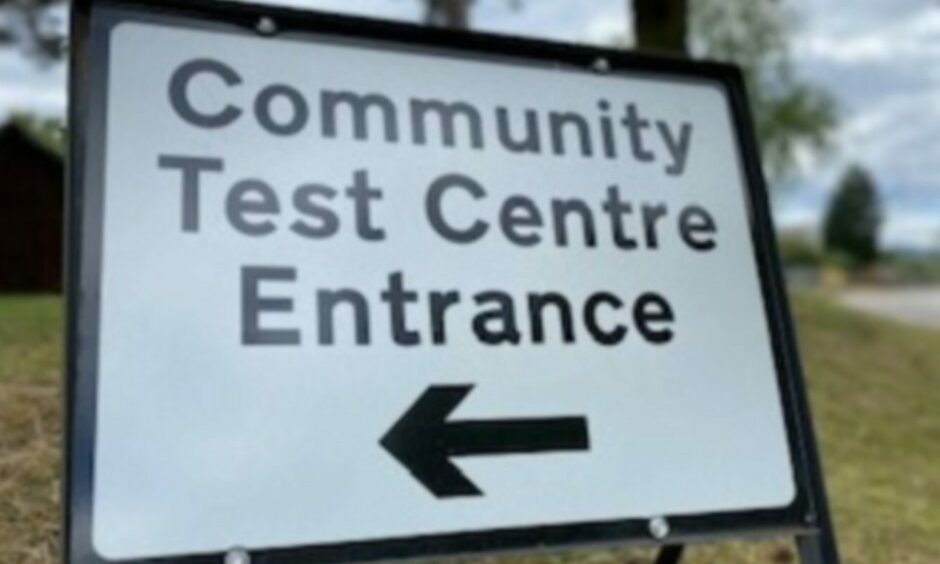A health chief has advised north-east communities with rising Covid numbers should “pretend” there’s been no relaxation of the rules.
Public health consultant Derek Cox issued the guidance as areas including Westhill, Tillydrone and Froghall in Aberdeen have been seeing high numbers of Covid cases, causing concern over an acceleration in infections.
Dr Cox stressed an increase in “mingling” has seen people’s average number of close contacts increase from 1.5 to 6.4, resulting in fears NHS Grampian contact tracers would struggle to cope with any potential third wave.
‘Pretend that the relaxation in restrictions hasn’t occurred’
“There are two best things people can do,” said Dr Cox.
“The first is, the people in these communities need to pretend that the relaxation in restrictions hasn’t occurred.
“People should still wear a face covering, carry on with regular hand washing, mingle less and still stay two metres apart – even if double vaccinated. These people might have less chance of dying or ending up in hospital, but they could still pass the virus on.
“The second thing people can do is to start testing themselves even if they have no symptoms.
“It’s now pretty easy to get hold of seven lateral flow tests. If they did these tests twice a week at least they would know when they need to immediately self isolate and protect others around them.”
The case positivity rate in Tillydrone currently stands on nearly 988 cases per 100,000 people, while there are 470 cases in the Froghall area.
Meanwhile, the latest figures show nearly 1,351 cases per 100,000 population in Westhill and Elrick and 393.4 cases in Westhill Central – making it the highest in Scotland over the last week.
‘We’ve had a case with 100 contacts’
Dr Cox warned a third wave could cause even more concern than the second, due to a rise social interaction in recent weeks.
He said: “We’ve come out of lockdown so people are just mingling more. If we look back to September-November last year, on average every Covid case that we saw had 1.5 close contacts.
“In the last two weeks, every Covid case we’ve seen on average has 6.4 contacts.
“I do mean on average – we’ve had a case with 100 contacts, and not an insignificant number of cases that have had 30 or 40 contacts.
“But when you average it out it’s 6.4 contacts per case – which is a huge increase.
“We think it’s a reasonable likelihood that we might get up to 300 cases a day in the coming weeks.
“The worry is, when we had 300 a day at the beginning of January, we coped with that because the number of contacts per case was still quite low.
“If we get up to 300 cases a day now, it would be very difficult to cope with because of the large number of contacts we’d have to follow up.
“So it’s an uncomfortable situation we could be getting into.”
A change in Covid attitude
When asked what could have led to the sudden rise in cases within the Grampian area, Dr Cox said he believes a change in attitude towards coronavirus could be to blame.
“I think the issue is that people think the virus is not dangerous anymore,” said the public health consultant.
“That’s the kind of feedback we’re hearing from people. The general attitude is ‘we’re young fit, unlikely to have a serious case, end up in hospital or die, so we don’t need to worry anymore’.
“I don’t think that people don’t know it’s still out there, it’s that people’s attitudes have changed.”
‘For goodness sake, take the vaccine’
Dr Cox also believes a change in attitude could have also been caused by more people being double vaccinated, and therefore believing they won’t catch or spread Covid at all.
“Some people also believe because they’ve had two vaccines they don’t have to worry about the virus anymore either – that’s not the case,” he said.
“We’ve got clear evidence that people who have had both vaccines are feeling like ‘that’s me okay now’.”
Offering advice to anyone who hasn’t yet had the Covid jab, Dr Cox said: “If you’ve got the option of taking the vaccine now, for goodness sake, take the vaccine.
“It’s easy, it’s painless, the side effects are unusual and when they do occur they are mild. Get the vaccine.”


